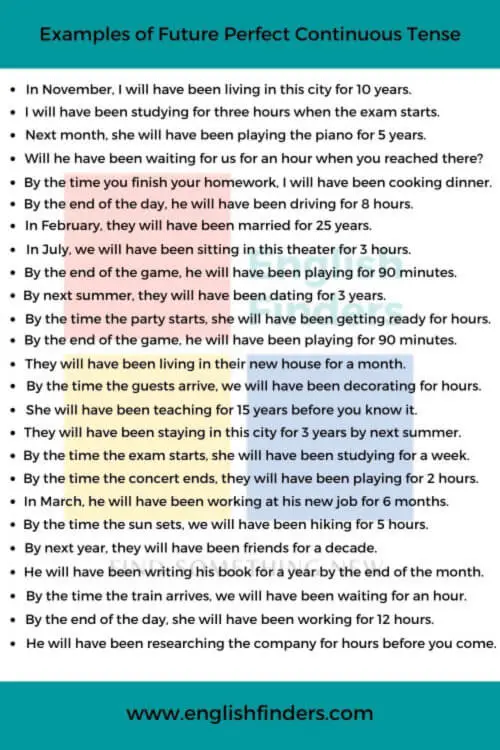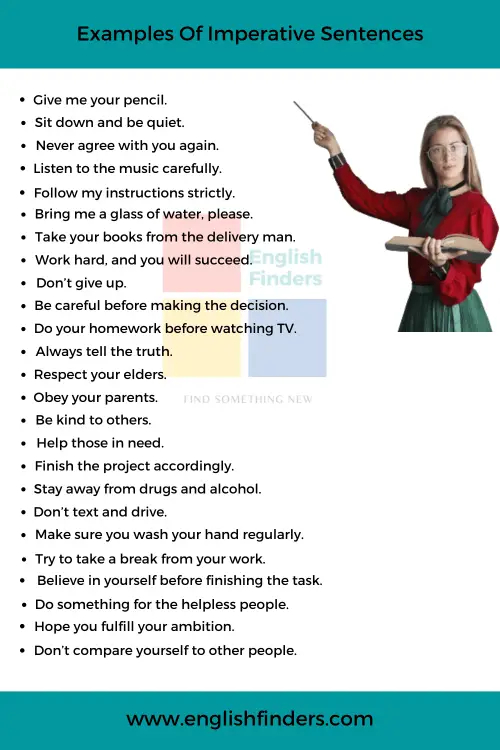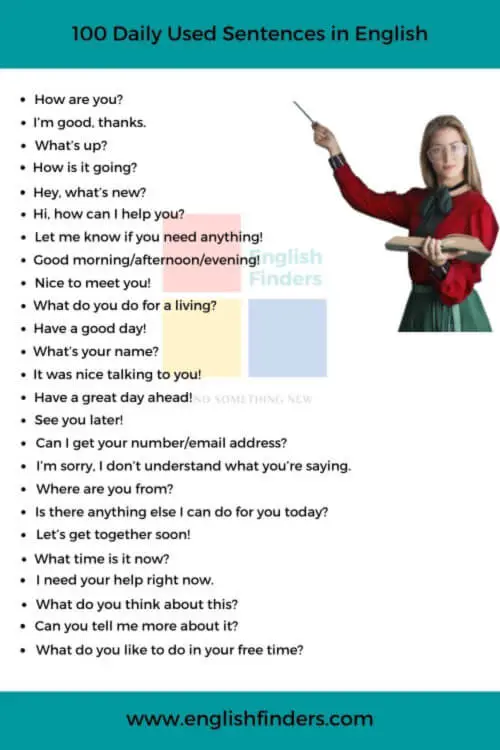What Is A Future Perfect Continuous Tense?
Before coming to the examples of the future perfect continuous tense, we have to learn what is the definition of the future perfect continuous tense. The future perfect continuous tense is a verb tense used to describe an ongoing action that will continue until a specified time in the future. It is formed by using the ‘auxiliary verbs’ will have been followed by the present participle (-ing) of the main verb. This tense is often used to talk about actions that will be in progress up until a specific point in time in the future. For example, “In January, she will have been living in the city for 10 years.”
The future perfect continuous tense is often used to talk about the duration of time. For instance, “By the time the concert ends, they will have been playing for 2 hours.” This sentence implies that the concert is ongoing and that the music has been playing for some time and will continue until the end of the performance. Similarly, “By the end of the day, she will have been working for 12 hours” suggests that the work has already started and will continue until the end of the day.
This tense can also be used to talk about ongoing actions that are expected to continue for a long period of time. For example, “By next summer, they will have been traveling the world for a year.” This sentence implies that the couple has already been traveling for some time and will continue to do so until the end of the year, at which point it will have been a full year since they started their journey.
50 Examples Future Perfect Continuous Tense
Let’s see the 50 useful examples of the Future Perfect Continuous Tense:
- I will have lived in this city in November for 10 years.
- By tomorrow morning, he will have been studying for 12 hours straight.
- By the end of the year, we will have been working on this project for two years.
- I will not have been studying for three hours when the exam starts.
- Next month, she will have been playing the piano for 5 years.
- Will he have been waiting for us for over an hour when you reached there?
- By the time you finish your homework, I will have been cooking dinner.
- He will have been driving for 8 hours by the end of the day.
- In February, they will have been married for 25 years.
- We will have been sitting in this theater for 3 hours in July.
- The employees will have been setting up for hours by the time the store opens.
- By the time the party starts, she will have been getting ready for hours.
- Will you have been traveling for 10 hours before we reach our destination?
- By the end of the game, he will have been playing for 90 minutes.
- They will have been living in their new house for a month.
- We will have been decorating for hours by the time the guests arrive.
- She will have been teaching for 15 years before you know it.
- They will have been staying in this city for 3 years by next summer.
- By the time the exam starts, she will have been studying for a week.
- By the time the concert ends, they will have been playing for 2 hours.
- He will have been working at his new job in March for 6 months.
- By the time the sun sets, we will have been hiking for 5 hours.
- She will have been practicing the guitar for 10 years.
- By next year, they will have been friends for a decade.
- By the time the event begins, they will have been planning it for months.
- He will have been writing his book for a year by the end of the month.
- They will have been running their business for 5 years.
- By the time the train arrives, we will have been waiting for an hour.
- By the end of the day, she will have been working for 12 hours.
- They will have been in their new job for a month by next week.
- By the time the party ends, they will have been dancing for hours.
- By next year, he will have been studying abroad for a semester.
- By the time the show starts, we will have been standing in line for an hour.
- By the end of the concert, she will have been singing for 2 hours.
- By next summer, they will have been traveling the world for a year.
- We will have been camping for 8 hours by the time the sun rises.
- She will have been working at the company for 5 years.
- By next month, they will have been learning French for a year.
- By the time the race ends, he will have been running for 3 hours.
- They will have been saving up for their dream vacation for 5 years.
- By the end of the game, they will have been playing against each other for an hour.
- She will have been warming up her voice for 30 minutes before you think about it.
- By next summer, they will have been building their dream home for 2 years.
- By the end of the month, he will have been volunteering at the shelter for a year.
- By the time the storm passes, we will have been hunkering down for 2 days.
- They will have been planning their wedding for 2 years by next year.
- They will have been preparing their presentation for 10 days.
- She will have been taking online classes for 6 months.
- They will have been working on their garden for 3 years.
- He will have been researching the company for hours before you come.
In conclusion, the future perfect continuous tense is a useful tense for discussing ongoing actions that will continue until a specific point in time in the future. It can be used to talk about the duration of time, ongoing actions, and long-term plans. By mastering this tense, writers can add depth and precision to their language, helping to convey complex ideas and events in a clear and concise manner.

Azizul Hakim is the founder & CEO of englishfinders.com. He is a passionate writer, English instructor, and content creator. He has completed his graduation and post-graduation in English language and literature.





